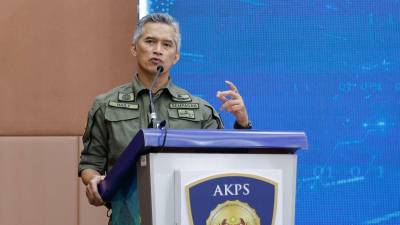
AKPS strengthens border management, builds agency identity
PUTRAJAYA : It has been a year since Parliament passed the Border Control and Protection Agency Act, paving the way for the establishment of the Malaysian Border Control and Protection Agency (AKPS) under the Home Ministry. AKPS director-general Datuk Seri Mohd Shuhaily Mohd Zain said the past year had not merely been an administrative journey, but also a process of fostering a new spirit and discipline among the agency’s personnel, who are now stationed at 22 of the country’s main entry points. He said AKPS is currently in a crucial phase of strengthening border management through improvements in its organisational structure, operational capabilities and the professionalism of officers on the ground. “The AKPS Act was passed and approved on Oct 17 last year, and we began full operations on Jan 1, 2025, through a pilot project in Rantau Panjang, Kelantan,” he said at the AKPS’ first anniversary celebration at the Home Ministry Complex here yesterday. Mohd Shuhaily said the agency currently has 6,215 officers, including 1,053 customs officers of various grades who were newly absorbed to carry out inspection duties at the country’s entry points. However, all positions are still in the process of finalising a permanent service scheme, in collaboration with the Public Service Department (PSD). “These officers are still seconded from their respective parent agencies, including the Immigration Department, Royal Malaysian Customs Department, Department of Quarantine and Inspection Services Malaysia (MAQIS) and the Department of Wildlife and National Parks (Perhilitan). I am responsible for overseeing daily operations at the country’s entry points,” he said, acknowledging that while the unification process was challenging, it had proceeded smoothly. In Budget 2026, the government allocated positions to recruit 220 Malaysian Armed Forces (MAF) veterans into the Malaysian Border Control and Protection Agency (AKPS), a move that Mohd Shuhaily described as an effort to ‘inject a spirit of defence and security’ into the agency. “When the announcement was made, I was personally surprised by the overwhelming response. Many MAF veterans, including those who held the ranks of Colonel and Major, came directly to the office to submit their resumes. This shows that the AKPS’s image is well received among MAF veterans,” he said He said the selection of MAF veterans was not only due to their military experience, but also because of their strong discipline and patriotic spirit, which required no further retraining. Apart from strengthening operations at the front line, Mohd Shuhaily said the recruitment move would also help reduce operating costs, as the selected veterans would be stationed near their areas of assignment, thereby saving on accommodation and transportation expenses. Mohd Shuhaily added that AKPS is also focusing on strengthening its technological capabilities to enhance border management efficiency, including the use of autogate systems and artificial intelligence (AI)-based cargo scanners. In addition, Mohd Shuhaily said he is focused on cultivating the ‘spirit of AKPS’ to ensure that all personnel understand the agency’s true purpose and role in safeguarding the nation’s borders. “I want AKPS to be a dignified agency, and our mission is to build a reputable name that commands respect,” he said, adding that comprehensive training programmes are being developed to standardise the agency’s work culture and embody the ‘spirit of AKPS’. He acknowledged that the agency faced initial challenges, particularly in inter-agency coordination and human resource limitations, but expressed gratitude for the dedication shown by officers who continued to perform their duties with unwavering commitment. “At headquarters, we only have 80 officers... directors write their own papers, drive their own cars and conduct their own research. Yet, they carry out their tasks with extraordinary enthusiasm,” he said. Recalling his first 100 days at AKPS, Mohd Shuhaily likened the restructuring process to a ‘merger and acquisition’ - one that demanded patience, cultural adaptation and a clear sense of direction. “I understand the sentiments of the original agencies when their officers are transferred to a new organisation - that is only natural. However, it is my responsibility to build confidence through clear leadership and a clear sense of direction,” he said. Mohd Shuhaily said he had also sought the assistance of the Inspector-General of Police to assign experienced officers to strengthen discipline and security, particularly at high-risk entry points such as Rantau Panjang, Port Klang, and several locations in Sabah and Sarawak. “I believe there are certain entry points that require PDRM leadership, as they possess critical operational expertise that can help achieve faster and more effective outcomes,” he said, adding that cooperation with other security agencies, including the MAF and the Royal Malaysia Police (PDRM), will continue to be enhanced. Ahead of Visit Malaysia 2026, Mohd Shuhaily said AKPS is expected to face additional challenges at major airports such as the Kuala Lumpur International Airport (KLIA), which is currently undergoing upgrades. However, he hoped the public would understand the importance of maintaining strict security procedures. “In other countries, even before landing, travellers are already thinking about whether they need to make a declaration. I want that same sense of respect - and healthy caution - for border laws to exist in Malaysia,” he said. Expressing his hopes for the agency’s future, Mohd Shuhaily said he wants AKPS to grow into a strong and respected institution. “I want to leave this post without burdens or negativity. I want AKPS to be remembered as a dignified, respected agency with a big heart,” he said. -- BERNAMA